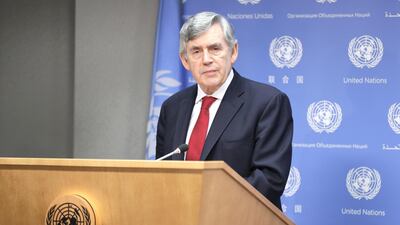Former British prime minister Gordon Brown has said debt relief and a new financing system should be used to increase funding for education.
“Education is the best route out of poverty for every child," Mr Brown told a Theirworld and the Global Business Coalition for Education event at the 75th UN General Assembly.
"What we were suggesting was the world comes together. We use the money that is available from debt relief ... about $80 billion of debt relief."
"We will give countries debt relief, but [they] spend the money on health and education," he explained.
The former UK prime minister highlighted how the Special Drawing Right (SDR), an international reserve asset created by the International Monetary Fund could be used to fund new education measures.
Mr Brown said over the next three years $1.2 trillion could be available for countries to draw on to spend on initiatives like education.
The UN General Assembly is meeting online for the first time because of Covid-19 restrictions.
The effect of the pandemic and the climate change emergency threatening the globe are high on the agenda for the word summit.
Mr Brown said the world already faced a crisis in education before the Covid-19 pandemic.
He said 400 million children around the globe are leaving school before the age of 11 and that 800 million children would leave without any qualifications.
“Don't ever forget, education is how we bridge the gap between what we are and what we have in ourselves to become, realising talent and potential,” Mr Brown said.
“And our children are more talented than the underfunded and pre-digital schools that we've condemned them to. We have got to do better."
Opening the event, UN Secretary General Antonio Guterres said the world could not afford a generation lost to the pandemic.
“As a new academic year begins in much of the world, two thirds of the global student population are not expected to attend classes,” Mr Guterres said
“This situation will have a disproportionate impact on the most marginalised and vulnerable students, many of whom may never return to school.
“Because of the Covid-19 pandemic, this has been a year of unprecedented disruptions.
“To rebuild from this pandemic, education is the key to unlocking the big change we need.
"Education can promote equality, great opportunities and jobs and build lasting peace.
“Education is central to sustainable development and helps to build resilience to future shocks.”
Unicef executive director Henrietta Fore said it was her goal to get every school, teacher and student online in the face of the global pandemic.
“We want to connect every school in the world to the internet," Ms Fore said.
"We can now do this because we have a world in which there is excellent technology, from low-Earth satellites, from fibre-optic cables, from Wi-Fi.
“And then we need to connect every learner and every teacher to the internet.
“We could, in the next four to five years, connect every school to the internet."























